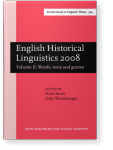Base etymology in the historical thesauri of deverbatives in English
Studied in the paper is a reflection of the synonymous strings of verbs in their shared-root coinages over time. The differences in the word-forming and thesaurus-construing potential between native and Romance etymology (Latinate and/or French lineage) parent verbs as regards substantive, adjectival, participial and second order deverbal classes have been established. The cross-sections of the historical thesaurus are forgeable on the parent verbs’ etymological affiliation and coinages’ suffix variance or uniformity. An electronic framework for the study of the rise of verbal and deverbal synonymous strings over time reconstructed on the basis of the OED textual prototypes proceeds from the constituents sequential placement or absolute dating. Two models of quantification suitable for determining the extent of similarity in the formation of synonymous strings are suggested. The etymological affiliation of parent verbs proves to be selectively related to the diachronic expansion of the respective (sub-)strings of varied lengths and category/formative(s) status.
